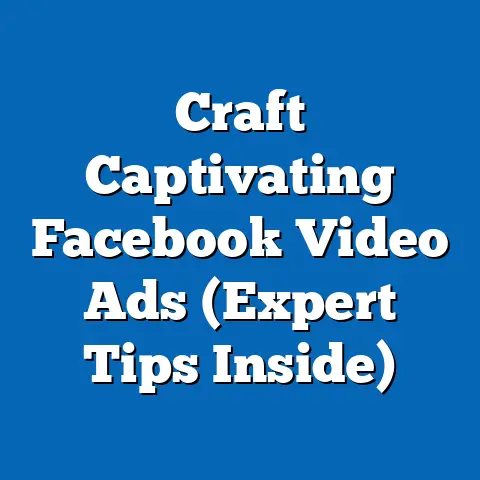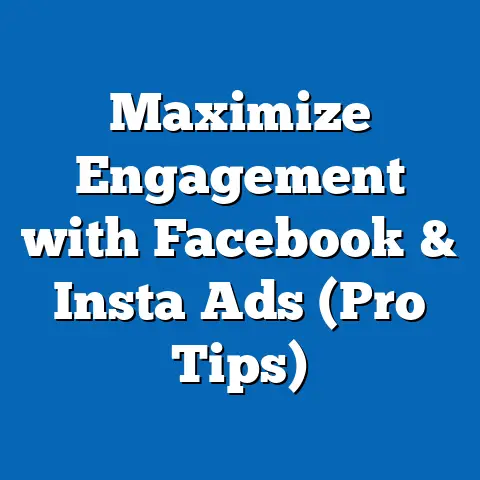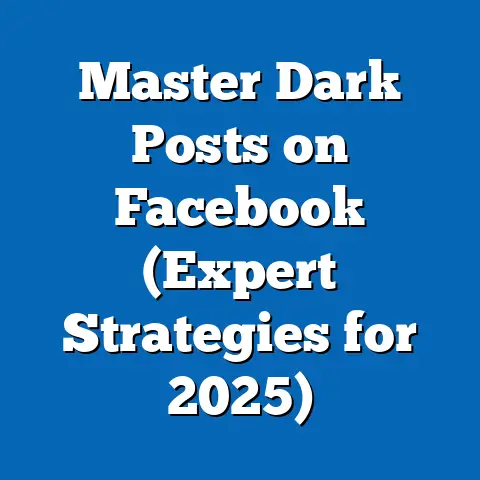Unlocking Facebook Ads Accounts (Essential Insights Revealed)
Unlocking Facebook Ads Accounts: Essential Insights Revealed
Have you ever felt that gut-wrenching moment when you realize your Facebook Ads account is locked?
It’s a feeling I know all too well.
I remember one client, a small business owner pouring her heart and soul (and budget!) into a new campaign.
We were seeing incredible results – leads were pouring in, sales were skyrocketing – and then, BAM!
Account locked.
The sheer panic in her voice when she called me is something I’ll never forget.
It wasn’t just about the money; it was about her livelihood, her dreams, and the connection she was building with her customers.
The potential loss of revenue, the wasted ad spend, and the agonizing missed opportunities – it all felt like a punch to the stomach.
That day, I vowed to help others avoid that nightmare.
This isn’t just about following procedures; it’s about understanding the human cost of these lockouts and fighting to get your voice heard again.
That’s why I’ve put together this guide: to provide you with the essential insights and actionable strategies you need to not only unlock your Facebook Ads account but also to prevent future lockouts.
Let’s get your ads back on track and your business thriving!
Understanding Why Facebook Ads Accounts Get Locked
Facebook, in its quest to provide a safe and valuable experience for its users, has strict advertising policies.
While these policies are in place to protect users from misleading or harmful content, they can sometimes feel like a minefield for advertisers.
I’ve seen so many well-intentioned campaigns get caught in the crossfire, leading to account lockouts.
Here are some common reasons why Facebook might lock your ads account:
Policy Violations: This is the most frequent culprit.
Facebook has extensive advertising policies covering everything from prohibited content (like hate speech or illegal activities) to restricted content (like alcohol or gambling ads, which require specific permissions).
Even unintentional violations, like using misleading headlines or making unsubstantiated claims, can trigger a lockout.- Example: I once worked with a health and wellness company whose ads were promoting a weight loss supplement.
They used phrases like “guaranteed weight loss” without sufficient scientific backing.
Facebook flagged the ads for making misleading health claims, and their account was temporarily restricted. -
Suspicious Activity: Facebook’s algorithms are designed to detect unusual activity that could indicate a compromised account.
This includes things like sudden changes in ad spend, unusual login locations, or a large number of rejected ads in a short period. -
Example: I had a client whose account was locked after they suddenly started running ads targeting a completely different demographic and geographic location than their usual audience.
Facebook suspected that their account had been hacked and took action to protect it. -
Payment Issues: If your payment method is declined, expired, or flagged for fraud, Facebook will likely lock your ads account until the issue is resolved.
-
Example: I’ve seen accounts locked simply because the credit card on file had expired without the advertiser realizing it.
It’s a simple oversight, but it can have significant consequences. - Circumventing Systems: This is a big no-no.
Trying to bypass Facebook’s ad review process or using cloaking techniques to show different content to Facebook than to users can lead to immediate and permanent account bans. - Low-Quality Ads: While not an immediate lockout, consistently running ads with low engagement rates, negative feedback, or high click-through rates to irrelevant landing pages can negatively impact your account’s reputation and increase the likelihood of restrictions.
- Example: I once worked with a health and wellness company whose ads were promoting a weight loss supplement.
Policy Violations: This is the most frequent culprit.
Facebook has extensive advertising policies covering everything from prohibited content (like hate speech or illegal activities) to restricted content (like alcohol or gambling ads, which require specific permissions).
Even unintentional violations, like using misleading headlines or making unsubstantiated claims, can trigger a lockout.
- Example: I once worked with a health and wellness company whose ads were promoting a weight loss supplement.
They used phrases like “guaranteed weight loss” without sufficient scientific backing.
Facebook flagged the ads for making misleading health claims, and their account was temporarily restricted. Suspicious Activity: Facebook’s algorithms are designed to detect unusual activity that could indicate a compromised account.
This includes things like sudden changes in ad spend, unusual login locations, or a large number of rejected ads in a short period.Example: I had a client whose account was locked after they suddenly started running ads targeting a completely different demographic and geographic location than their usual audience.
Facebook suspected that their account had been hacked and took action to protect it.-
Payment Issues: If your payment method is declined, expired, or flagged for fraud, Facebook will likely lock your ads account until the issue is resolved.
Example: I’ve seen accounts locked simply because the credit card on file had expired without the advertiser realizing it.
It’s a simple oversight, but it can have significant consequences.- Circumventing Systems: This is a big no-no.
Trying to bypass Facebook’s ad review process or using cloaking techniques to show different content to Facebook than to users can lead to immediate and permanent account bans. - Low-Quality Ads: While not an immediate lockout, consistently running ads with low engagement rates, negative feedback, or high click-through rates to irrelevant landing pages can negatively impact your account’s reputation and increase the likelihood of restrictions.
Suspicious Activity: Facebook’s algorithms are designed to detect unusual activity that could indicate a compromised account.
This includes things like sudden changes in ad spend, unusual login locations, or a large number of rejected ads in a short period.
Example: I had a client whose account was locked after they suddenly started running ads targeting a completely different demographic and geographic location than their usual audience.
Facebook suspected that their account had been hacked and took action to protect it.
Payment Issues: If your payment method is declined, expired, or flagged for fraud, Facebook will likely lock your ads account until the issue is resolved.
Example: I’ve seen accounts locked simply because the credit card on file had expired without the advertiser realizing it.
It’s a simple oversight, but it can have significant consequences.
It’s crucial to understand that Facebook’s advertising policies are constantly evolving.
What was acceptable last year might not be acceptable today.
I make it a point to regularly review the latest updates and guidelines to ensure my campaigns stay compliant.
Ignorance of these policies is no excuse, and it can cost you dearly.
Remember that business owner I mentioned earlier?
A big part of the reason her account got locked was because she wasn’t aware of a recent change in Facebook’s policy regarding lead generation ads.
Key Takeaway: Familiarize yourself with Facebook’s advertising policies and stay updated on any changes.
Proactive compliance is the best defense against account lockouts.
The Immediate Steps to Take When Your Account is Locked
Discovering that your Facebook Ads account is locked can be a truly terrifying experience.
Your mind races, and you’re probably thinking of all the worst-case scenarios.
Take a deep breath.
Don’t panic!
There are steps you can take to resolve the situation.
I’ve been through this process with countless clients, and I know it can feel overwhelming, but following these steps will give you the best chance of getting your account back up and running:
Step 1: Check the Email Notification from Facebook for Details.
The first thing you should do is check your email associated with your Facebook account.
Facebook usually sends an email explaining why your account was locked and what steps you need to take to resolve the issue.
This email will be your guide, so read it carefully.
Don’t just skim it!
Look for specific details about the policy violation or the reason for the lockout.
Step 2: Log in to Your Ads Manager and Review Any Notifications.
Even if you receive an email, it’s essential to log in to your Ads Manager.
There, you’ll often find more detailed information about the lockout, including the specific ad or campaign that triggered the restriction.
Pay close attention to any red flags or error messages.
Facebook will usually provide a link to the relevant policy or a form to appeal the decision.
Step 3: Follow the Prompts to Appeal the Decision or Verify Your Identity.
- Appeal the Decision: If you believe your account was locked in error or that you’ve addressed the policy violation, you can submit an appeal.
This involves filling out a form explaining your situation and providing any supporting documentation. - Verify Your Identity: In some cases, Facebook may require you to verify your identity by providing a government-issued ID or other documentation.
This is to ensure that you are who you say you are and that your account is legitimate. - Update Your Payment Information: If the lockout was due to a payment issue, you’ll need to update your payment information and ensure that your account is in good standing.
Crafting a Compelling Appeal:
Your appeal is your chance to make your case to Facebook.
Here are some tips for crafting a compelling appeal:
- Be Polite and Professional: Even if you’re frustrated, it’s essential to remain polite and professional in your communication with Facebook.
Avoid using accusatory language or making demands. - Be Clear and Concise: Explain your situation clearly and concisely.
Avoid rambling or providing irrelevant information.
Get straight to the point and explain why you believe your account was locked in error. - Acknowledge the Policy Violation (If Applicable): If you did violate a policy, acknowledge it and explain what steps you’ve taken to correct the issue.
Show Facebook that you’re taking responsibility and are committed to complying with their policies in the future. - Provide Supporting Documentation: If you have any supporting documentation that can help your case, include it with your appeal.
This could include screenshots, invoices, or any other evidence that supports your claims. - Emphasize Your Commitment to Facebook’s Community: Remind Facebook that you value their platform and are committed to creating a positive experience for their users.
Explain how your ads benefit their community and how you’re helping to achieve their goals.
I remember helping a client whose account was locked because they were running ads for a local event that included images of alcohol.
While alcohol ads are generally restricted, there are exceptions for events that are targeted to adults and comply with local regulations.
In their appeal, we provided documentation proving that the event was 21+, that they had the necessary permits, and that they were committed to responsible advertising.
Facebook reviewed their appeal and reinstated their account.
Key Takeaway: Act quickly, gather all necessary information, and craft a compelling appeal that demonstrates your commitment to Facebook’s policies.
Best Practices for Preventing Future Lockouts
Prevention is always better than cure.
Once you’ve gone through the ordeal of having your Facebook Ads account locked, you’ll want to do everything in your power to prevent it from happening again.
I’ve learned that being proactive and implementing some best practices can significantly reduce your risk of account restrictions.
Here are some essential steps you can take to safeguard your account:
- Regularly Review Facebook’s Advertising Policies and Updates: As I mentioned earlier, Facebook’s advertising policies are constantly evolving.
It’s crucial to stay informed about any changes or updates that could affect your ads.
Make it a habit to review the policies regularly, even if you think you know them inside and out. - Maintain Consistent Payment Methods and Ensure Funds are Available: Payment issues are a common cause of account lockouts.
Make sure your payment method is valid, up-to-date, and has sufficient funds to cover your ad spend.
Consider setting up a backup payment method in case your primary card is declined. - Use Two-Factor Authentication for Added Security: Two-factor authentication adds an extra layer of security to your account by requiring a code from your phone or another device in addition to your password.
This makes it much harder for hackers to access your account and run unauthorized ads. - Monitor Your Ads Regularly for Policy Violations: Don’t just set it and forget it.
Regularly monitor your ads to ensure they comply with Facebook’s policies.
Pay attention to any warnings or notifications from Facebook and take action to correct any issues promptly. - Avoid Using Deceptive or Misleading Advertising Practices: Be honest and transparent in your advertising.
Avoid using clickbait headlines, false claims, or deceptive images.
Focus on providing value to your audience and building trust. - Target Your Ads Appropriately: Make sure your ads are targeted to the right audience.
Avoid targeting sensitive demographics or using discriminatory practices. - Keep Your Software and Plugins Updated: Outdated software and plugins can create security vulnerabilities that hackers can exploit.
Keep your software and plugins updated to protect your account from malware and other threats. - Limit Access to Your Ads Account: Only grant access to your ads account to trusted individuals.
Be careful about sharing your login credentials or granting administrative privileges to people you don’t know well. - Create a Business Manager Account: If you’re running ads for a business, it’s essential to create a Business Manager account.
This allows you to manage your ads account, pages, and other assets in a secure and organized way. - Stay Away From Black Hat Tactics: Black hat tactics are methods used to trick the system and go against Facebook’s terms of service.
This includes buying fake likes, using automated software to generate leads, and cloaking your website.
If you get caught, your account will be permanently banned.
I remember working with a client who was so relieved after implementing these proactive measures.
They had previously experienced several account lockouts due to payment issues and unintentional policy violations.
After implementing two-factor authentication, setting up a backup payment method, and regularly reviewing their ads for compliance, they finally felt confident that their account was secure.
The peace of mind they gained was invaluable.
It allowed them to focus on creating great ads and growing their business without constantly worrying about being shut down.
Key Takeaway: Proactive compliance, security measures, and responsible advertising practices are essential for preventing future account lockouts.
Navigating the Appeal Process
Even if you’ve taken all the necessary precautions, there’s still a chance that your Facebook Ads account could be locked.
If that happens, it’s essential to know how to navigate the appeal process effectively.
The appeal process can be frustrating and time-consuming, but it’s your best chance of getting your account back up and running.
Here’s a detailed explanation of the appeal process:
- Review the Reason for the Lockout: Before you start the appeal process, make sure you understand why your account was locked.
Review the email notification and any notifications in your Ads Manager.
Identify the specific policy violation or the reason for the lockout. - Gather Supporting Documentation: Collect any supporting documentation that can help your case.
This could include screenshots, invoices, contracts, or any other evidence that supports your claims. - Submit Your Appeal: Once you have all the necessary information, you can submit your appeal through the Facebook Ads Manager.
The appeal form will typically ask you to explain your situation and provide any supporting documentation. - Be Patient: The appeal process can take time, so be patient.
Facebook typically responds to appeals within 24-48 hours, but it can sometimes take longer. - Follow Up (If Necessary): If you haven’t received a response within a reasonable amount of time, you can follow up with Facebook support.
Be polite and professional in your communication and reiterate your request for assistance. - Be Prepared to Provide Additional Information: Facebook may request additional information or clarification during the appeal process.
Be prepared to provide any information they need promptly and accurately. - Consider Seeking Professional Help: If you’re struggling to navigate the appeal process on your own, consider seeking professional help from a Facebook Ads expert.
They can help you understand the policies, craft a compelling appeal, and communicate with Facebook support.
Maintaining a Positive Relationship with Facebook Support:
During the appeal process, it’s essential to maintain a positive relationship with Facebook support.
Even if you’re frustrated, avoid being rude or accusatory.
Remember that the support team is there to help you, and they’re more likely to be responsive if you’re polite and respectful.
Here are some tips for maintaining a positive relationship with Facebook support:
- Be Polite and Professional: Always be polite and professional in your communication with Facebook support.
Avoid using accusatory language or making demands. - Be Clear and Concise: Explain your situation clearly and concisely.
Avoid rambling or providing irrelevant information. - Be Patient: The appeal process can take time, so be patient.
Don’t bombard Facebook support with emails or messages. - Be Respectful of Their Time: Facebook support teams are often overwhelmed with requests, so be respectful of their time.
Don’t ask them to do things that you can do yourself. - Thank Them for Their Help: Always thank Facebook support for their help, even if you’re not satisfied with the outcome.
I’ve seen firsthand how maintaining a positive relationship with Facebook support can make a difference in the outcome of an appeal.
One of my clients had their account locked due to a misunderstanding about their targeting practices.
Instead of getting angry or defensive, they reached out to Facebook support, explained their situation calmly and professionally, and provided all the necessary documentation.
The support team appreciated their approach and worked with them to resolve the issue quickly.
Key Takeaway: Patience, professionalism, and clear communication are essential for navigating the appeal process successfully.
Conclusion
Having your Facebook Ads account locked can be a truly disheartening experience.
It’s like having your voice silenced in the digital world, especially when you’ve poured your heart and soul into building your business and connecting with your audience.
But remember, this isn’t the end of the road.
I’ve shared with you the essential insights and actionable strategies you need to unlock your Facebook Ads account, restore your access, and prevent future lockouts.
We’ve explored the common reasons why accounts get locked, the immediate steps to take when it happens, best practices for prevention, and how to navigate the appeal process effectively.
The key takeaways are:
- Stay informed about Facebook’s advertising policies and updates.
- Act quickly and gather all necessary information when your account is locked.
- Craft a compelling appeal that demonstrates your commitment to Facebook’s policies.
- Implement proactive compliance and security measures to prevent future lockouts.
- Maintain a positive relationship with Facebook support throughout the appeal process.
I want you to know that you’re not alone in this journey.
Many advertisers have faced similar challenges, and with the right knowledge and strategies, you can overcome them.
Take control of your Facebook advertising future by implementing the strategies we’ve discussed.
Embrace the challenge, stay persistent, and never give up on your vision.
Remember that business owner I mentioned at the beginning?
We got her account back, and her campaign is now thriving.
Key Takeaway: Challenges can be overcome, and you have the tools to unlock your Facebook Ads accounts successfully.
Call to Action:
I encourage you to share your experiences with locked accounts in the comments below.
Let’s create a community of support and help each other navigate these challenges together.
What strategies have worked for you?
What challenges have you faced?
Share your insights and let’s learn from each other.
Together, we can unlock our Facebook Ads accounts and achieve our advertising goals!






